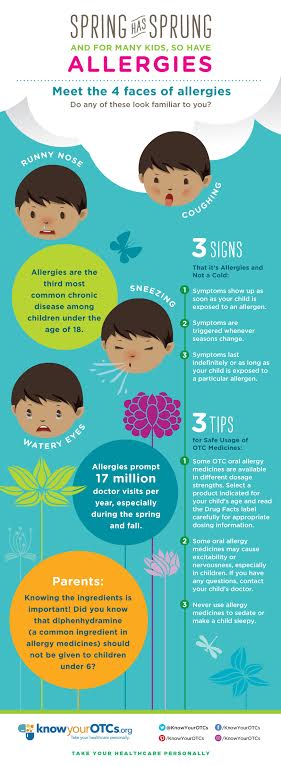Spring allergies are here in all their glory. That’s right, everybody. It’s time for runny noses; itchy, watery eyes; headaches; and all the other miserable things that so many of us suffer from due to the beauty of nature. As most of my readers know, my son has allergies to pretty much everything, so although we love spring and all the fun it brings, we are at the mercy of spring allergies.
*I am a KYOTC ambassador and compensated for this post. All my opinions are my own and not swayed by outside sources.*
Spring Allergies are Springing Up All in Your Face!
Did you know that allergies are the third most common chronic disease among kids aged 18 and younger? It’s an epidemic, and many of these kids are SEVERELY allergic like my son is. What’s more, these allergies are the cause of 17 million visits to the doctor every year. That’s a lot of allergic misery.
Spring Allergies aka Hay Fever
Spring allergies are most often referred to as Hay Fever. Although we all have a general idea of what Hay Fever is, we may not know all the ins and outs of it. Dr. Wendy Sue Swanson of Seattle Mama Doc was kind enough to share some great information regarding Hay Fever, its symptoms, and how to deal with it with all of us. You can find these tips and more on her blog post about allergies here.
- Hay fever is the most common allergy in Americans and represents the allergic reaction to pollens in the air & environment. Seasonal allergy sufferers see symptoms at particular times of year when specific allergic triggers (grass or tree pollen, for example) circulate. However, some children and adults can have allergies to more than one pollen or trigger, thus having symptoms at various times throughout the year. Most children who suffer from hay fever feel a noted shift in symptoms around the same time each year though, i.e. “during T-ball season Oliver always needs his allergy meds.”
- Typically seasonal allergies are first seen after the preschool years although they can develop at any time during childhood, usually before age 10. Symptoms of allergies commonly change with age, peaking in severity when people are in their 20’s, and then often subsiding as adults age.
- Allergies do tend to run in families. If one parent has allergies, there’s a 25% chance a child will too! And if your child is lucky enough to have two sneezers for parents, the risk of developing allergies soars to over 60%.
- There are a lot of OTC allergy medicines that can help relieve allergy symptoms in children. There are a few choices in using oral medicines in children for sneezing, runny noses, hives and rashes associated with allergies. In addition, OTC nasal sprays (intranasal steroids) are now available without a prescription to help with allergies over an allergy season in older children when used daily. Talk with your pediatrician if your child is using allergy medicines nearly every day as intranasal steroid sprays can sometimes dramatically reduce allergy symptoms!
- If your child comes in from the yard or from a park itchy and sneezy, consider having them take a shower or bath to get all that pollen off of their bodies and clothes to reduce the exposure and symptoms.
Tips for Dealing with Spring Allergies
Spring allergies are annoying and uncomfortable, but they can be dealt with. You can find relief for you and your family members with OTC medications to help alleviate the discomfort of spring allergies.
- Antihistamines: Antihistamines such a Benadryl and Zyrtec are available over the counter to help combat the histamine that causes allergic symptoms.
- Nasal Sprays: Unlike Benadryl and Zyrtec, which work throughout the body, nasal sprays reduce the amount of histamine released and the resulting symptoms experience int he nasal cavity.
OTC medications can be a big help in combating the discomfort of allergies with spring is springing all over the place, but it’s important to be careful with them. Always red the label and make sure to only give OTC medications as directed or as prescribed by your doctor. Remember these important safety facts when administering medications for spring allergies:
- Many OTC allergy medications come in different dosages. Always read the Drug Facts label carefully to be sure you give the correct dosage to your child.
- Some oral allergy medications can cause excitability or nervousness in children. Contact your doctor if you have any questions.
- Never, never use allergy medication to help your child sleep.
For more information on safe OTC medication practices, visit the KnowYourOTCs page to learn everything you need to know about medications, allergies, and how to be safe while you help your kids.